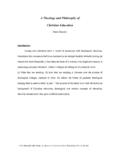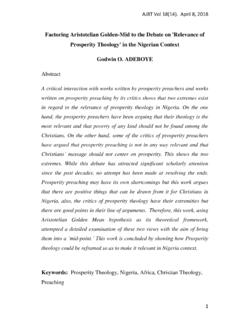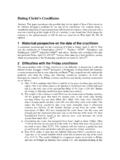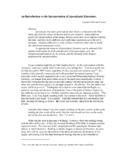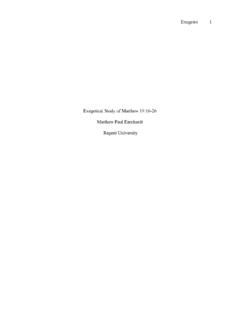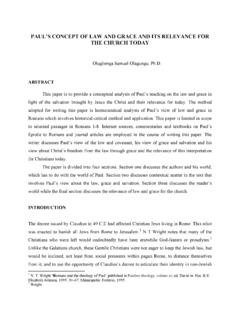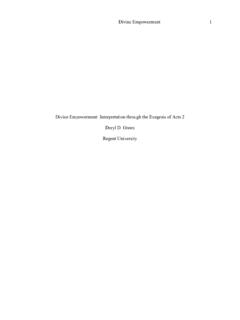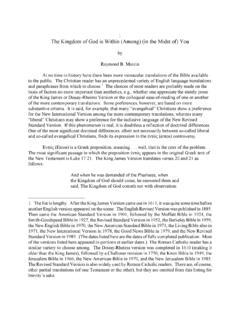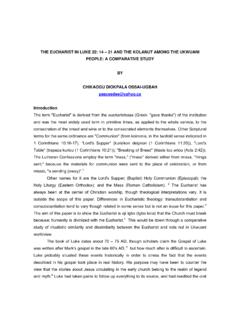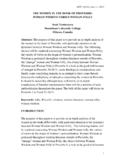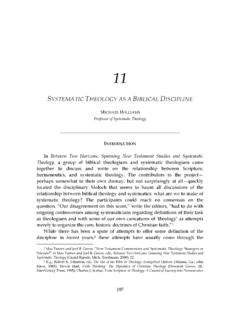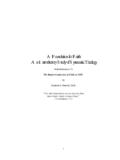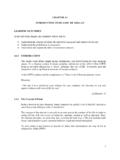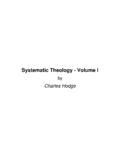Transcription of Re-examining the Theological Functions of “Seek …
1 1Re- examining the Theological Functions of Seek the Lord (b qqa d n y) in Zephaniah 2:1-3, for Contemporary Society Rev. Dr. Michael U. Udoekpo Abstract Zephaniah 2:1 3 is a Theological delight and a translational crux for exegetes and theologians. It reaches its climax with three imperatival parallel exhortation, Seek the Lord (b qqa d n y), Seek righteousness (b qqa tsaddiq) and Seek humility, (b qqa n v h). Using hermeneutics of faith, this essay examines the addressee as well the Theological function of these phrases. It argues that the shameless nations, (v. 1) and the poor of the land ( ) are the Theological recipients of Zephaniah s prophecy. And concludes that the Theological and ethical Functions of Zephaniah 2:1 3 are primarily exhortative and salvific for the faithful remnants of every age, time and culture.
2 I. Introduction The prophecy of Zephaniah (2:1 3) captures the nature of God s relationship with Israel. It is a relationship that demands obedience and total repentance from idolatries, to a witness of God s mercy, love and generosity. This unit (Zeph 2:1 3) has always been a Theological delight and a translational crux for many An invitation to seek the Lord (b qqa d n y), righteousness (b qqa tsaddiq) and humility (b qqa n v h) forms its exhortative and ethical climax. Who are the addressees and what are the ethical intentions or the Theological Functions of these imperatival statements? These are recurring questions which this study intends to theologically reappraise, but with the help of faith This is the harmony of faith and reason, biblical exegesis and systematic It is a scientific reading with an explanatory power, from the heart of the This approach has a twofold unifying power.
3 (1) the power to hold fast the entire testimony of the sources, comprehend their nuances and pluriformity, (2) the power to transcend the differences of cultures, divisions, times and peoples, civilization and their Hermeneutic of faith also represents a reverent listening, a seeking after the living voice of God who in his gracious love speaks to us in the human words of the biblical It is a dialogue in faith with God who speaks to the human person in every culture the living experience of the people of God, the With this approach this study translates the text and maintains in its exegesis the links between our unit of focus (Zeph 2:1 3) and the past prophetic traditions, particularly the remaining passages of Zephaniah, which emphasizes divine judgment (1:2 18) and salvation for those who repent in Judah and in other nations (2:4; 3:1 20).
4 In other words, the shameless nations ( ), and the humble of the land ( ), in this essay represent the 2particular and universal recipients of these prophetic words. Besides the universal salvific elements of this unit (Zeph 2:1 3), its Theological Functions are dynamic and fundamentally exhortative for faithfulness. II. Exegetical and Theological Analysis of Zephaniah 2:1$3 In Zephaniah (2:1 3) we read: BHS8 My Provisional Translation hithq s s w q ss ( ) Gather, and gather yourselves together hagg y lo nikh s ph ( ) O shameless nation not longing for b terem ledeth choq k mots bhar y m ( ) Before you are driven away like the chaff in the day b terem lo "y b l khem ch r n aph" d n y ( ) Before the fierce anger of the Lord comes to you b terem lo "y b l khem ch r n aph" d n y ( ) Before the Day of the Lord s anger comes upon you b qqa eth" d n y kol" an v h rets, ( ) Seek the Lord all you humble of the land sher mishepp t p l ( ) Who do his commands b qqa tsaddiq b qqa n v h ( ) Seek righteousness, seek humility lay tiss th r b y m aph" d n y ( )
5 Perhaps you may be hidden on the day of the Lord s anger This pericope many scholars would agree poses a translational crux such that any translation and interpretation must be highly tentative. 9 It contains an ambiguous expressions and rare words, whose meaning is problematic and sometimes unclear, even in its Ben Zvi, however, considers these words and expressions as characteristic and typical of The difficulties begin right away with the initial verse ( ) where we meet a double imperatival usage of hithpolel (hithq s s ) and qal (w q ss ). Many theologians agree that these double imperatives share a common root verb q , derived from the noun q ( stubble or straw ).12 Questions have been raised whether these imperatives in Zephaniah 2: 1 3 were used with the intended meaning of gathering straw or John Gray, for instance in A Metaphor from Building in Zephaniah II, I , argues that, although q is the identifiable root verb, it is not derived from the noun q.
6 Rather, he contends that it is related to the verb q h to be hard, severe. He then translates this prime verse ( ) as stiffen yourselves and stand firm. 14 However, I would argue along Ben Zvi s line that the use of hithpolel and qal of q , here seems to fit well into Zephaniah s creative style of employing rare terms not common in other OT passages. We find some exceptions in the Book of Exodus where the poel form of the verb is used 3to characterize Israelites who are subjected by Pharaoh s order to gathering their own straw (Exod 57 12; cf. Num 15:32 33; 1 Kings 17:10 12). 15 Modern biblical versions and translators have also grappled with the meaning of this prime verse of the prophet Zephaniah ( ).16 Theologically, Sz les sees in this text, particularly on the bases of RSV s translation come together, a moral or spiritual implication of pulling oneself together, or returning to one s consciousness or state of Berlin views the specific sense of gather like straw as figurative in order to highlight the vulnerability of disobedient Judean and other nations to God s fire of anger ( ).
7 18 These modern commentaries and translations, including mine, undoubtedly bear the imprint of the generalized meaning given to this text by ancient versions as assembling oneself. In the LXX, for instance, we have sunachth te kai sundeth te ( be gathered together and unite together, closely followed by the Vulgate s convenite congregamini (assemble, be gathered). Similar translations are found in Symmachus, Targums and in the Granted the difficulties the translation of these prophetic words (Zeph 2:1a) may pose to ancient and modern scholars the sense of gather and gathering of oneself, for me, is theologically more appealing for few reasons. The first, Zephaniah, if I may reiterate is known for using rare and difficult words to communicate his prophecy. Secondly, this sense of gathering of Israel is repeatedly in different forms throughout the entire text of Zephaniah.)
8 For example we read two verbs s ph, (hiphil imperfect) signifying annihilate or sweep, and soph (infinitive absolute), with the basic meaning of to gather together (Zeph 1:1 3). Again in the last chapter of Zephaniah we have q bats in the infinitives and piel imperfect forms (Zeph 3:8, 19, 20), with similar meanings of gather or In addition the niphal verb nikh s ph (Zeph 2:1b) has its own translational challenges. K saph means different things in different contexts. For example in the same text of Zephaniah kseseph means silver or money (Zeph 1:18). This has made some to associate the k saph ( long for ) in Zephaniah 2:1b with the semetic root word money or silver. 21 For me this is not very convincing. There two other texts in the OT that can help shed light on the meaning of the use of k saph in our specific unit of investigation (Zeph 2:1 3).
9 The first is the episode where Laban says to Jacob, his son in law now that you had to leave because you were really longing for (k saph) your father s house, why did you steal my gods (Gen 31:30). The second is the song my soul longs and pines for (k saph) the courts of the Lord, my heart and flesh cry out for the living God (Ps 84:3). In these two texts we notice the verb k saph occurs in niphal but with the active meaning to long for or to desire. 22 It is probably in this sense of desire or long for, as suggested by Hunter, that k saph is used in our text (Zeph 2:1b).23 In addition, since the proposition for is not deployed in Zephaniah, Kapelrud suggests that nikh s ph be given passive translation O nation which is not desired. 24 4 This seems to resonate with the Vulgate s gens non amabilis (O nation that is not loved or undesirable nation).
10 Similarly, in the LXX we have to ethnos to apaideuton (undisciplined, unchastened or unruly nation). Yet many believe it has been influenced by Aramaic tradition which translates nikh s ph as be ashamed. 25 My conclusion to all these is that whether nikh s ph is used in the passive or active sense, the basic meaning of a nation not seeking or longing for the Lord, or that has lost God s favor theologically stands out. Verse 2 of our (Zeph 2:1 3) unit also presents some translational difficulties for theologians. The MT attests b terem ledeth choq k mots bhar y m ( before giving birth or delivering a statue/decree or chaff or wild flower has crossover as a day ), throwing the door open for varieties of Similarly, the LXX attests pro tou genesthai humas h s anthos paraporeuomenon (before you become like the flower that passes over).
